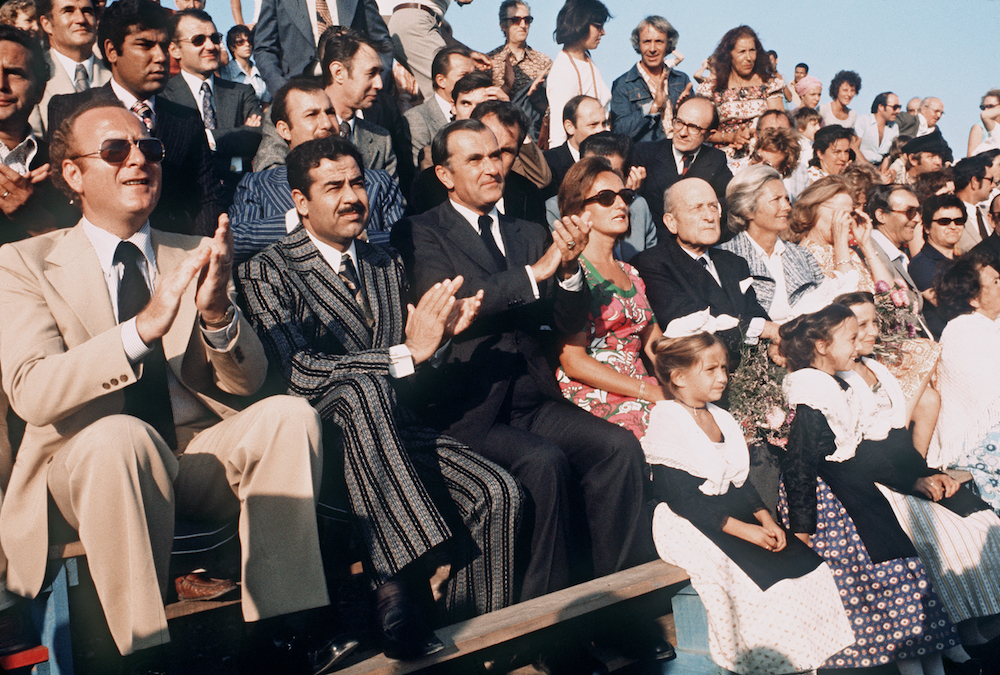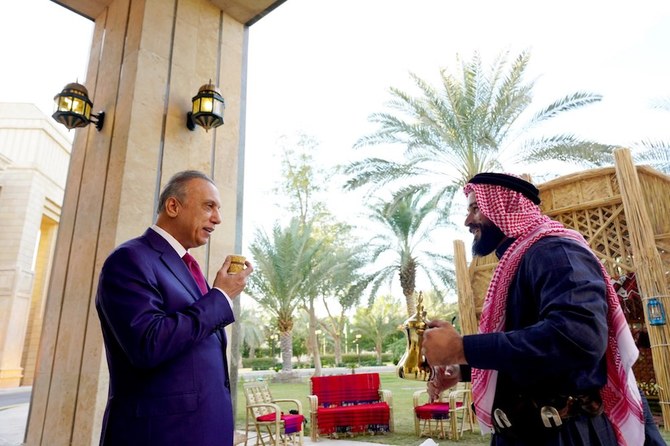DUBAI: Iraq was a cradle of civilization long before it was established as a modern nation state exactly 100 years ago, the country’s prime minister, Mustafa Al-Kadhimi, said during a speech on Saturday marking the country’s centenary.
Addressing the Iraqi public in a televised message, he said the special occasion was an ideal opportunity to look at the country objectively, take pride in its achievements and admit where it had made mistakes.
Although the Iraqi state as we know it today was formally established by the British at the Cairo Conference in 1921, “it does not mean that Iraq was not a country a hundred years ago,” Al-Kadhimi said.

A horse-drawn tram makes its way through a Baghdad street in this picture dated 1925. (AFP)
“The ground upon which Iraqis are standing firmly was the first country known to humanity, the first law to organize human life, the first policeman whose job was to protect people, and the first military soldier to defend the borders and sacrifice himself.
“Here, on the land guarded by the souls of your parents and ancestors, was the first economic organization to preserve rights, property, sale and purchase, and the first punishments for human rights violators.
“It was the first of poetry, art and culture, the first base of mathematics, and the first moment of revelation and prophecy.”

The young King Faisal II of Iraq takes the oath at the age of 18, in front of the Parliament May 5,1953 in Baghdad. (Intercontinentale/AFP)
Indeed, humanity owes many of its earliest achievements in a number fields, including agriculture and astronomy, to the civilizations that flourished in ancient Mesopotamia, the land between two rivers, more than five millennia ago.
From the Akkadians and the Assyrians to early Islamic civilization, the peoples who inhabited this region created many of the world’s first known institutions of government, systems of writing and numeracy, and epic works of literature.
In his centenary speech, Al-Kadhimi said it was the responsibility of all Iraqis, no matter their political alignment, to recognize this heritage, pass it on to future generations, and protect it from those who seek to manipulate it for their own ends.
“It is time to look at our country objectively and be proud of its achievements and admit its mistakes,” he added. “And we move forward armed with our inheritance and the abilities of our people to stand together with all successful countries.”
Arab leaders sent messages of congratulations to the people of Iraq on the anniversary, including Saudi Crown Prince Mohammed bin Salman, who spoke with Al-Kadhimi by telephone on Sunday, according to the Iraqi PM’s media office.
In his own message of support, Egypt’s President Abdel Fattah El-Sisi described the centenary as an important moment in the shared history of the Arab world.

A picture dated 1957 shows King Faisal II (C) with Lebanese President Camille Chamoun (R) and King Faisal's uncle Abdel Illah during the King's visit to Lebanon. Abdel Ilah became a regent to the throne after King Faisal's father King Ghazi died April 6, 1938. (AFP)
“One hundred years have passed since the Cairo Conference in 1921, which launched the establishment of the Iraqi state as an extension of an ancient civilization rooted in the depths of history,” he said.
“One hundred years have witnessed many milestones in the path of Iraq, the Arab nation, and indeed the whole world. On my own behalf, and on behalf of the Egyptian people, we congratulate brotherly Iraq on this precious occasion, wishing its great and honorable people peace, security and stability, and hoping that Iraq would always remain an asset for the Arab nation.”
After gaining its independence from the British Mandate established after the First World War, the kingdom of Iraq was founded in 1932 under Faisal I, a member of the Hashemite dynasty who was born in Saudi Arabia.
He ruled for 12 years, under a constitutional monarchy imposed by the British, until his death from a heart attack at the age of 48. Faisal’s son, King Ghazi, took the throne but died six years later in a car accident in Baghdad. The title of king fell to Faisal II, who was just 3 years old, and so his reign began under the regency of his uncle, Crown Prince Abdallah.
Highly intelligent, and leading a country blessed with a wealth of natural resources, Faisal seemed destined to build on the foundations established by his father and grandfather when he took the throne, at the age of 18, in 1953. Iraq at the time was prospering; oil revenues were flowing in and the country was undergoing rapid industrialization.
But the tide would soon start to turn against the kingdom. Iraq’s close relationship with the British — a policy Faisal II continued — became the source of increasing hostility, which was exacerbated by the Suez crisis in 1956.

Iraqi leader Saddam Hussein (2L), French Defense Minister Yvon Bourges (3L), Bernadette Chirac (4L) Prime Ministers's wife, and les Baux-de-Provence's Mayor Mr. Tuillier (1L) applaud during a corrida organized by the municipality in honor of the Iraqi leader on September 7, 1975 in Les Baux-de-Provence, southern France. (AFP)
On July 13, 1958, when two army brigades were ordered to go to Jordan to help quell a crisis in Lebanon, Abdul Karim Qassim, a disaffected officer leading one of the units, saw his chance and sent troops to the Qasr Al-Rihab palace in Baghdad. By early the following morning, they had surrounded the royal residence with tanks and opened fire.
Shortly after 8 a.m., King Faisal II, his uncle the crown prince and other members of the royal family and their staff were ordered to leave through a rear entrance and killed.
Many Iraqis still believe this was the start of a catastrophic downhill slide for the nation. While it lasted less than four decades, the constitutional monarchy is viewed by many as a golden period in Iraqi history. The king’s execution gave way to a tumultuous republic and, ultimately, the brutal dictatorship of Saddam Hussein.

Undated picture of Iraqi president Abdul Karim Qassim, who overthrew King Faisal II in a coup on July 14, 1958. Qassim was himself deposed in a coup on Feb. 8, 1963, and executed the following day. (AFP)
More than 60 years later, Iraq is redefining itself yet again and reasserting its sovereignty. On Thursday, Dec. 9, Iraqi officials announced that the US had officially ended its combat mission in Iraq, reassigning all remaining troops to a training and advisory role. US forces had returned to Iraq at the invitation of the Baghdad government to help combat the Daesh extremist group that had seized territory in the northwest of the country and in neighboring Syria during the summer of 2014.
The ongoing presence of foreign forces in Iraq has long been a source of political disagreement in Baghdad, with many nationalist and pro-Iran factions demanding a full withdrawal.
“After a matter of days, we will witness the withdrawal of all combat forces of the international coalition from Iraq within the scope of the strategic agreement with the American side, and their role will be in the areas of advice, as a sign of the ability of Iraqi forces in all its categories to preserve the security of Iraq, stabilize its people and its continued development,” Al-Kadhimi said.
However, the overarching theme of Al-Kadhimi’s centenary speech was an appeal for all Iraqis to recognize what unites them rather than what divides them, for the common good of the country.

Photo dated 1976 shows former Iraqi President Ahmad Hassan Al-Bakr (R) sitting with then-Vice President Saddam Hussein in Baghdad. Al-Bakr took power in July 1968 following the ouster of Gen. Abdul Rahman Aref and stepped down in July 1979 for health reasons. (AFP)
“Amid the political challenges and efforts that the last election has arranged, everyone should be reassured: We will not allow them to touch your safety and stability,” he said.
“Despite all the differences, the political powers, new currents, independent people and elites are the sons of this country and they are keen on it and its safety.
“The difference in views and directions fades in front of everyone’s belief that Iraq is our umbrella and our home, and to mess with it and its future is a red line,” he added.
“This is Iraq, your Iraq, and the Iraq of all humanity. To preserve it and to inherit it is our duty.”































